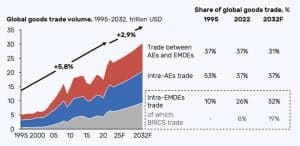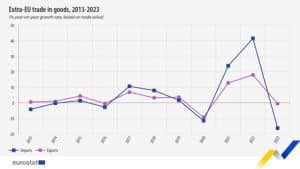PNN – The head of the Department of New Processes and Global Financial Markets at the Plekhanov Economic University of Russia considered the significant progress in the next decade to be the BRICS group and said: Thanks to the launch of the BRICS bridge, the member countries of this group will act independently of Western sanctions within the framework of this financial settlement and digital payment system.
In an interview in Moscow, Svetlana Fromina emphasized the importance of the 16th summit of BRICS leaders in Kazan and added: In this framework, the mutual trade circulation between the member countries of the BRICS group can increase significantly.
She added: Cooperation in the BRICS group will seek initiatives in the field of creating a new cross-border payment infrastructure compatible with the needs of the participants and the competition in the international financial market is being strengthened.
Ensuring fair financial relations between member states
This lady economist said: The proposed development plan in the BRICS payment system, emphasizing payment in national currencies, is a safe and non-political solution that allows countries to carry out financial transactions regardless of sanctions and unilateral decisions of Western countries.
She stated: The proposed plans are based on advanced technology, comprehensive and able to guarantee fair financial relations between countries.
The role of BRICS in the global economy is increasing
Referring to the joining of the Islamic Republic of Iran, Egypt, the United Arab Emirates, Ethiopia and Saudi Arabia to the BRICS group from the beginning of 2024, Furmina said: The expansion of the geographical scope of this group has increased its influence in the world economy – both in terms of gross domestic product and in terms of trade volume.
She added: The average economic growth rate of the BRICS member countries in the second quarter of 2024, despite the increase in macroeconomic shocks, is 3.1 percent, and the economic growth of leading countries such as India is 6.7 percent, China is 4.7 percent, and Russia is 4.1 percent has been reported.
Referring to Moscow’s approach in the field of trade, this Russian professor said: Russia alone increased trade turnover with BRICS countries to 294 billion dollars in 2023, which shows a growth of 2.5 times compared to the previous year.
Read more:
The role of BRICS in the world economy is increasing
Head of the Department of New Processes and Global Financial Markets at Plekhanov Economic University of Russia said: Taking into account the trend of cross-border trade in the world, which has shifted towards the market of developing countries, the role of BRICS in the global economy is increasing.
She noted: According to the forecasts of the Central Bank of Russia, internal trade between developing economies will increase from 26 to 32 percent by 2032.

The different growth trend of BRICS and Europe
Fromina continued: The opposite picture can be seen in EU member states, whose economic growth rate slightly exceeded 0.6% in the second quarter of 2024, which is significantly lower than the global average.

She added: According to the report of the Statistical Center of the European Union (Eurostat), the world trade of goods of this union has decreased significantly in 2023, and the member states of this union have focused on the domestic market again.
According to her, in 2023, the largest share of European Union goods exports to non-euro zone countries was to Germany, whose economy is in recession.
BRICS will show its superiority in the next decade
This Russian economist believes that the BRICS group will show its superiority in the next decade by implementing its innovative plans.
She pointed out: Unlike EU countries, the trade turnover of BRICS countries is increasing; According to the reports of the Russian Congress Research Foundation, not only the trade trend between the BRICS members, but also outside of it is on the rise.
She reminded: BRICS also dominates the global market of natural resources and provides more than 40% of the global oil production and about 25% of the global export of raw materials.
Russia, as the rotating chairman of the BRICS group in 2024, has planned about 250 events in this framework. The most important event is the BRICS summit, which is held in Kazan, Russia.
The Islamic Republic of Iran, which has joined the BRICS group since the beginning of 2024, will officially participate in the summit of this group as a member for the first time.
About BRICS
The group of emerging economies was founded in 2006, on the sidelines of the 61st session of the United Nations General Assembly in New York. At that time, the foreign ministers of Russia, Brazil and China and the defense minister of India held a separate special meeting to agree on the development of diverse cooperation in a quadrilateral framework.
The first summit of this group was held in Yekaterinburg, Russia in 2009, when they agreed in the final joint statement that coherent, active, pragmatic, open and transparent dialogues and cooperation will not only benefit developing countries and emerging markets, but also Develop to create a harmonious world order that ensures sustainable and shared peace.
At that time, this group was referred to as BRIC (consisting of the first letters of the names of Brazil, Russia, India and China).
With the accession of the Republic of South Africa in 2011, the letter “S” (the initials of the name South Africa) was added to “Brick”.
At the BRICS summit in South Africa, President Cyril Ramaphosa announced that the members of this group have decided to invite Argentina, Egypt, Ethiopia, Iran, Saudi Arabia and the United Arab Emirates to become full BRICS members.
Argentina’s new president then announced that his country would not join the group. Sergei Ryabkov, Deputy Minister of Foreign Affairs of Russia, whose country holds the rotating presidency of the BRICS group, said in response to a question about this: We are not canceling the invitation from Argentina, the invitation remains. We will see how the further development of BRICS goes and what our Argentinian colleagues will conclude on this matter.
Among the new members, Saudi Arabia’s participation in BRICS events has been minimal. According to Konstantin Kasachev, the senior senator of the Russian Federation Council, Riyadh is still considering participation in the BRICS group.
Earlier, Russian Foreign Minister Sergei Lavrov, referring to the request of more than 30 countries for membership or close cooperation with the BRICS group, announced that at the meeting of the foreign ministers of the member countries of this group, it was decided to stop accepting new members of this group.

